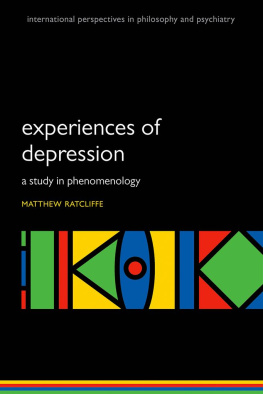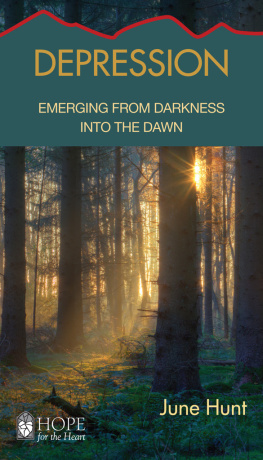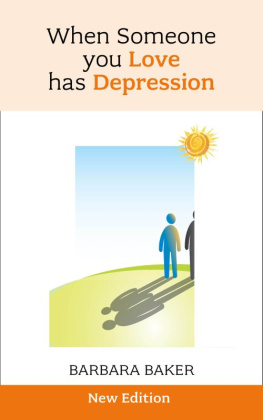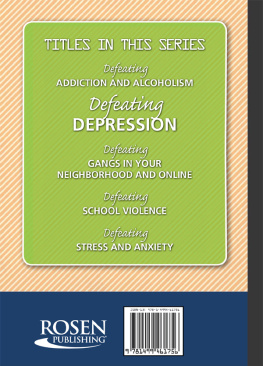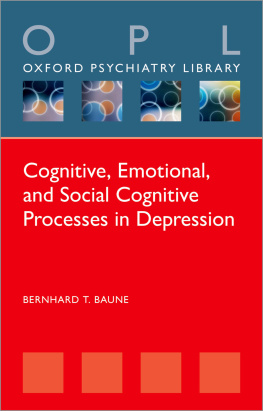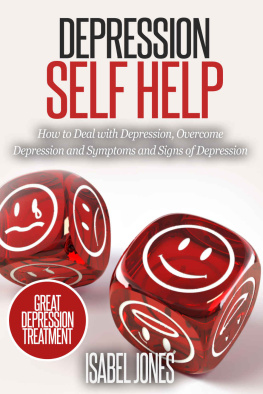Title page
Depression, Emotion and the Self
Philosophical and Interdisciplinary Perspectives
Edited by
Matthew Ratcliffe and Achim Stephan
Body matter
Copyright Imprint Academic, 2014
www.imprint-academic.com
2014 digital version by Andrews UK Limited
www.andrewsuk.com
The moral rights of the authors have been asserted.
No part of this publication may be reproduced in any form without permission, except for the quotation of brief passages in criticism and discussion.
Published in the UK by
Imprint Academic Ltd, PO Box 200, Exeter EX5 5YX, UK
Distributed in the USA by
Ingram Book Company,
One Ingram Blvd., La Vergne, TN 37086, USA
This volume was originally published as a special issue of the Journal of Consciousness Studies , (7-8).
Cover image by Beth J. Ross.
Matthew Ratcliffe, Achim Stephan and Somogy Varga : Introduction
First-person accounts of depression almost always emphasize the extent to which depression departs from what is - for most of us - everyday experience. It is often described as akin to inhabiting a different world, a suffocating, alien realm that is isolated from the rest of social reality. On the basis of a very substantial body of testimony, it seems that depression is not simply a matter of certain unpleasant emotions being heightened while other emotions are diminished. The phenomenological changes that the depressed person undergoes are somehow more profound than that. They involve a qualitative shift in the overall structure of experience, encompassing self, agency, the body, temporal experience, interpersonal relations, and the sense of being rooted in a world. Many sufferers add that this shift or some aspect of it is indescribable, ineffable, and that the various metaphors they appeal to are ultimately inadequate to the task. Furthermore, some state that an inability to communicate the experience of depression exacerbates the sense of alienation that is already so central to it. When we turn to diagnostic manuals, matters are no clearer; skeletal descriptions of the various symptoms that are together sufficient for one or another diagnosis do nothing to further illuminate the kinds of phenomenological change that patients struggle to describe.
Hence an aim of this volume is to draw upon work in philosophy and other disciplines in order to cast light upon poorly understood experiences that are associated (but, most likely, not exclusively associated) with depression. Depression, construed broadly, is consistent with a range of diagnoses. However, most of our contributors emphasize kinds of experience that would be compatible with a DSM-IV or DSM-5 diagnosis of major depression. A further aim of the book is to draw upon the phenomenology of depression in order to better understand the structure of experience more generally. By contrasting the phenomenology of depression with everyday experience, we can draw attention to and attempt to describe aspects of the latter that might otherwise be overlooked. It is also our hope that this kind of enquiry will have some kind of practical application. In so far as failure to understand depression experiences can itself exacerbate them or at least hinder therapy, the results of phenomenological studies have the potential to inform clinical work. Furthermore, an increased understanding of what it is like to experience depression may benefit those who live or work with people who suffer from depression.
The principal focus of the volume is upon moods, feelings, and emotions, although that focus is far from exclusive. The theme of depression, emotion, and the self intersects with a wide range of topics, including selfhood, motivation, the body, intersubjectivity, and world-experience. Furthermore, most contributors emphasize kinds of affective state that are generally neglected by discussions of mood and emotion in philosophy and the sciences. First-person reports of depression often describe a kind of all-enveloping affective change that permeates every aspect of experience. Hence, unlike many accounts of emotional states, the chapters in this collection tend not to concern themselves principally with intentional states that have specific contents. Affect, in the sense that is central to depression, is inextricable from experiences of self, belonging to a world, and being with other people. Another prominent theme of the volume is interdisciplinarity; contributors share the view that, in order to understand the nature of emotional experience in depression, one needs to draw upon and bring together work in a range of disciplines.
The chapters are grouped into four sections. The first three pieces are all concerned with self and agency. Svenaeus investigates the relationship between selfhood and depression. He offers a phenomenological analysis that focuses upon the bodys capacity to engage in different patterns of resonance or attunement to the world. Svenaeus argues that, while boredom, anxiety, and grief are to be described as ways of being-in-the-world, depression is characterized by a deficiency of bodily resonance that alienates the self from the world. Slaby, Paskaleva and Stephan then defend a broadly enactive approach to understanding emotions, which resists the common view according to which emotions are mental states that can be characterized in isolation from agency and action. They apply this approach to the affective aspects of depression. Drawing upon patient reports, they interpret affective changes in depression as something like a mirror image of human affectivity, where the core impairment involves an altered sense of agency. Their discussion is complemented by the work of Benson, Gibson and Brand , who draw upon an empirical investigation of suicidal feelings in individuals suffering from psychiatric illness. Rather than describing these feelings in cognitive terms (as suicidal ideations), the authors identify them as existential feelings, feelings that constitute an all-enveloping backdrop to experience of self, world, and other people. Benson, Gibson and Brand invoke a complex concept of agency that takes into account the embodied and (socio-culturally) embedded nature of our affective lives. Drawing on this, they argue that, in suicidal feelings, experience of the self as agent is disrupted in several ways.
The next four chapters all address the comparative phenomenology of depression. They explore the similarities and differences between experiences associated with depression and other psychiatric diagnoses, as well as addressing whether such differences should be regarded as superficial or profound. Radden considers those moods that are distinctive of depressive and manic states, and offers an account of their relationship with more cognitive states. It is often maintained that schizophrenia-spectrum disorders involve disruptions in pre-reflective self-experience and that this makes them distinctive. However, Radden argues that affective or mood disorders also involve disruption of the self, albeit on a different level, hindering self-integration. This is because moods in depression and mania are inflexible, resistant to change, and thus interfere with first-person evaluation of their effects on judgment and response. Moreover, they tend to impede certain types of self-knowledge and give rise to epistemic deficits, thus reducing the capacity for agency. Two chapters by Sass and Pienkos follow. Their first chapter addresses some apparent similarities between experiences of self in schizophrenia and in affective disorders like melancholia and mania, which might seem to blur the phenomenological boundaries between them. These, according to Sass and Pienkos , in fact hide more profound differences. Drawing upon findings obtained with the EASE (a research tool for phenomenological psychopathology used to study experiential changes in five domains of selfhood), they argue that the most basic sense of self - the minimal self - remains intact in affective disorders, while it is disrupted in schizophrenia. In a second chapter, Sass and Pienkos continue their investigation into the comparative phenomenology of schizophrenia, melancholia, and mania, but shift the focus from self-experience to world-experience. They supply a comparative study of subtle similarities and differences in anomalous perceptions of the world, relating to experiences of space and objects, events and time, and general atmosphere. While some degree of alienation from the world is a common theme, Sass and Pienkos argue that there is a distinctive uncanniness to schizophrenic experience. Then, Stanghellini and Rosfort turn to the emotional dimensions characteristic of borderline depression, in contrast to melancholic depression. Borderline individuals frequently experience intense emotional fluctuations and disproportionate emotional reactions, associated with lack of a stable sense of self-identity. Stanghellini and Rosfort argue that these complex emotional characteristics are attributable to trait-like dysphoric moods that lack intentional structure and that simultaneously involve a sense of fragmentation and of vitality (hence a desperate vitality).
Next page

